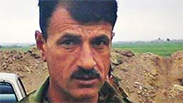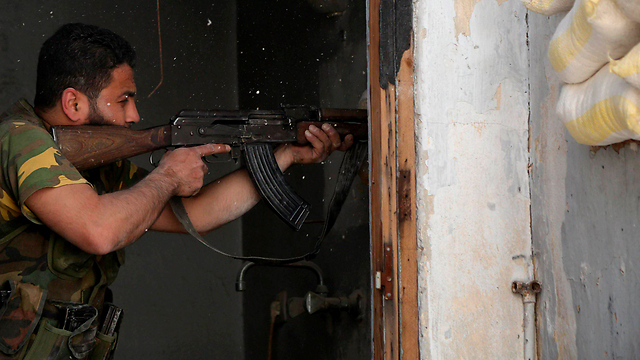
The desperate plight of Syria's army
Analysis: Video of Assad's most loyal soldier pleading for ammunition has been leaked online, raising questions about the future of the regime fighting force.
Syria's top soldier, Colonel Suhail al-Hassan, aka al-Nimr (the Tiger) – the officer sent out to oversee the Syrian Army's toughest missions against the rebels, the man who can pick up the phone and call in air strikes and artillery bombardments on any region he chooses – was shamed of late by a recently released Internet video.
In the video, the Alawite "hero" is seen and heard placing a call from the city of Aleppo and begging the regime in Damascus to supply ammunition to his forces. Leaked online, the call, placed either to Syrian Defense Minister Fahad Jassim al-Freij or President Bashar Assad himself (the party on the other end of the line can't be heard), is a clear indication of the dire straits in which the Syrian Army currently finds itself. So what has led to the Syrian military's downfall since the summer of 2014? And what are the possible implications for the sector in general and Israel in particular?
In the few interviews he has given since 2011, al-Hassan has expressed absolute loyalty to Assad, claiming that Syria is not in the throes of a revolution or civil war, but is instead fighting a "global conspiracy to overthrow the regime." And the man, who has become a living legend, is sent to the most intense conflict areas, where he has notched up various significant military achievements in the regime's struggle against the rebels.
He has been sent to the worst war zones in Syria. He is credited with ending the rebels' siege in Aleppo, opening up the routes and communications between areas that had been cut off, primarily the Latakia-Idlib-Aleppo axis, and constructing access routes for military vehicles.
Al-Hassan is known to be a brutal fighter. He is believed to have come up with the idea of using barrel bombs to solve the problem of a shortage of missiles. His fighting style is characterized by the complete destruction of enemy areas. His immediate force, consisting of thousand highly trained troops, raids enemy territory following heavy artillery fire and aerial bombing. He fought with the help of the Shabiha the infamous thugs of the Assad regime, which it calls "the national defense."
The "Tiger" himself says there is no room for mercy for the opposition, as they are not human at all, but rather maniacal bombers who walk around with explosives belts attached to their bodies. These people, he says, kill civilians and soldiers indiscriminately with knives and guns, call all of their enemies "infidels" and murder in the name of religion. The vast majority are not Syrian but mercenaries, he maintains.
But while the regime in Damascus views al-Hassan as a hero fighting bravely against terrorism, the European Union has branded him a war criminal, and he is a persona non grata on the continent.
Close to collapse
The turnaround in the state of the Syrian Army first appeared in the summer of 2014, when rebel squads in southern Syria united and took control of most of the Golan Heights border area, in the Quneitra Province. The Syrian regime's forces then took another significant blow in the winter, when the al-Nusra Front and six other opposition groups joined to form Jaish al-Fatah, and managed to drive the Syrian Army out of large areas of the Idlib Province in the northwest of the country.
The economic crisis in Syria – as a result of the global sanctions on Russia and Iran, the two main supporters of the Syrian military – appears to be taking its toll; and Saudi Arabia's lowering of oil prices has weakened the Syrian economy even further, leaving it unable to provide the regime's forces with sufficient ammunition and fuel. In addition, the American airstrikes on Islamic State targets in northern Syria have allowed the other Sunni rebel groups to focus their efforts against the regime's forces in the west of the country.
The Arab media was filled this past week with reports about al-Hassan's panicky call to Damascus, with questions raised about the future of the Syrian Army. Is the regime again on the verge of collapse like it was in 2012? The loss of control in the field is causing the Syrian Army to amass more forces near Damascus and leave the Golan border area to Hezbollah.
If the Syrian Army continues to withdraw, Iran will have to step up its involvement in the area. In such an event, Hezbollah will be left with no choice but to "waste" large numbers of fighters in the battle against the rebels in Syria.
And perhaps the organization will also have to dip into its arsenal of rockets and missiles that it had planned to use for a different purpose, namely to target Israel.
Dr. Yaron Friedman, Ynet's commentator on the Arab world, is a graduate of the Sorbonne. He teaches Arabic and lectures about Islam at the Technion, at Beit Hagefen and at the Galilee Academic College.












